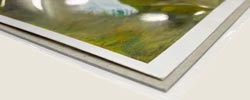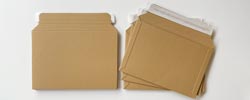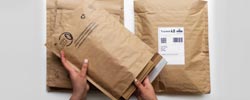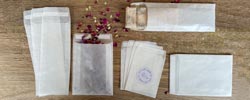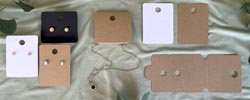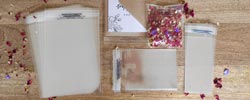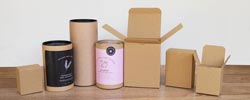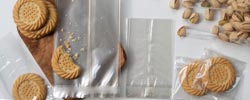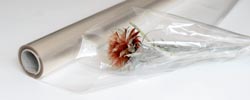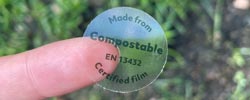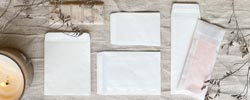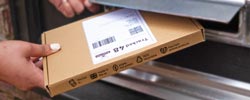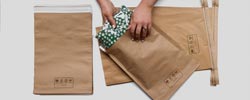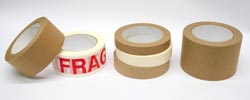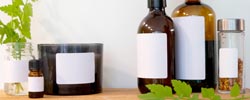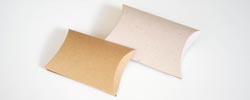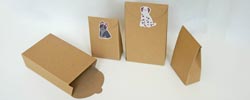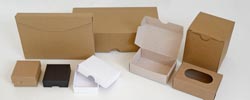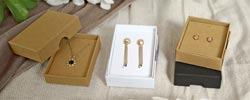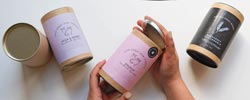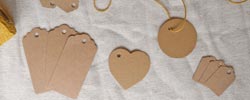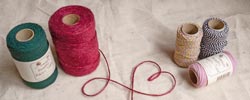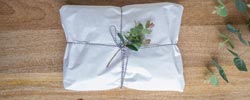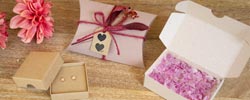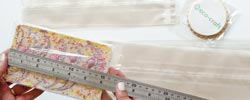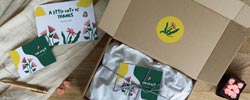What is PLA compostable film?
In appearance, many end users will find our Bio-based film bags almost identical to the old polypropylene bags we used to supply. In normal retail conditions they are quite stable – they are designed to break down by composting at ‘end of life’ not during storage. Although many of our customers have been using our compostable bags since we launched them in 2007 - for those of you who are new to the material, the following information should help to explain the differences between conventional petro-chemical based display bags and our new bio-based compostable replacements.
BIODEGRADATION:
All our Bio-based film bags are made in the UK from film made from annually renewable vegetable starch and are certified compostable to ‘OK biobased’ and DIN EN 13432. This which means that they break down to CO2 and water which can then be reused in the eco system to make new plants. This process can happen in either commercial or home composting but in commercial composting the temperature will be higher and the process is much quicker. (As a guide, the film specs state that it takes approx. 45 days for them to decompose at a constant 58°C - similar to that found in industrial composting.) The composting process uses naturally occuring bacterial / fungi to break down the film into CO2 and H2O and ecotoxic free biomass (compost). In a colder home composter or landfill this will require the presence suitable bacteria / fungi to start the process and it will just take longer. The time scale will largely depend on the local conditions, it will inevitably take longer to compost in the Highlands of Scotland than it does in Cornwall or Southern France.
RENEWABLE RESOURCE:
Our Bio-based PLA bags are made from vegetable starches derived from an annually renewable crops, as opposed to petro-chemical based plastics such as the polypropylene bags we used to sell, which come from a finite resource.
SHELF LIFE:
The shelf life of Bio-based PLA film in ideal conditions (at room temperature, kept away from humidity and direct sunlight) should be up to 12 months, but may well be a good bit longer (Some of our original starch bags lasted longer but the new vegetable starch bags from a different supplier were only launched a couple of years ago, so until they start to degrade we don't have a definitive time scale). The main thing to maximise shelf life, is to avoid exposure to humidity and excessive heat, moisture and light. So, realistically in normal shop use you should get many months if not a year or more before any degradation could start to show. Bio-based PLA film bags are also very stable should they be splashed with water - they don't start to degrade immediately so if wiped off promptly they should come to no harm. Exposure to bright direct sunlight such as in a shop window can result in degradation / discolouration over time, however this is only likely to be a problem in extreme conditions.
BIO-BASED FILM LIMITATIONS:
Although biofilm (PLA) is quite a versatile material there are some jobs for which it is not suitable. It is more brittle and marks more easily than polypropylene - so is not robust enough for heavy or sharp items. It also needs to be handled with a little more care than polypropylene while packing cards etc. (Hopefully in the future they will be able to develop a more robust version of the film.) Also, it is not water proof so is not suitable for containing wet products. (If splashed with water and wiped off straight away they should come to no harm).
Our Bio-based PLA film can't be used for archival purposes and we cannot guarantee them to be 'acid free' for use with valuable paintings etc.
SELF SEAL STRIPS:
Although the Biofilm bags are compostable, the current batch of peel off strips are the same as those used on polypropylene bags. So at present these strips are not compostable but we are working with our supplier towards a biodegradable solution. We’re looking at manufacturing trials with a new material - so hopefully something for the future.
OXO-DEGRADATION:
There has recently been some confusion between bio-based film (PLA) and oxo-degradable plastics. Oxo-degradables are conventional plastics with additives to assist their disintegration into micro-plastic particles. You can therefore be assured that we DO NOT supply oxo-degradable plastics. All of our Bio-based film (PLA) and Cellulose bags are biodegradable and compostable – they are NOT oxo-degradable!
According to the Bio-Based and Biodegradable Industries Association (BBIA) recent newsletter Oxo degradable plastics are NOT bioplastics. "Oxo-degradables are conventional plastics with additives to assist their disintegration into micro-plastic particles. Under USA usage, but also in other countries around the world, it is illegal practice to call these plastics biodegradable. Indeed, the European Commission in their 16th January 2018 Plastics Strategy declared they will take measures to limit the use of Oxo plastics in the EU. See http://ec.europa.eu/environment/circular-economy/pdf/oxoplastics.pdf ".
If disposed of irresponsibly this material can break down into small particles which are the sort of plastic particles shown getting into the food chain on recent news articles and Blue Planet II. Therefore, we will not be stocking any of this material and hopefully the current greenwash from the conventional plastic bag trade about oxo-degradable plastics will come to be seen for what it really is. To see a copy of the BBIA report see http://bbia.org.uk/faq and please feel free to pass it on.
COMPOSTABLE BAG DISPOSAL:
1) Compost Heap: This is what they are designed for so is the best option. (They are suitable for both home and industrial composting)
2) Council Garden waste bin: Although this would work you would need to check with your local council to ensure that that this waste is going for industrial composting. (Also, you could end up 'at odds' with the council for putting what they could view to be the wrong waste in the bin.)
3) Food Waste Bin: This would also be suitable but once again it might be best to check what the council is doing with this waste. (The bags are suitable for anaerobic digestion or industrial composting, if they will allow you to put them in).
4) General Waste Bin: Although possibly not viewed as the perfect option, in landfill they will break down to CO2 and water in much the same way as they would in a compost heap.
5) Recycled Paper and Card Bin: They should not go in with paper for recycling.
6) Recycled Plastic Bag Collections: They should not go in this bin either. Biodegradable and compostable film is made from renewable plant materials, not petrochemicals. It is designed to break down to CO2 and H2O so leaves nothing suitable for recycling unlike traditional plastic bottles etc.
Hopefully this will enable you to choose the best option for environmentally responsible disposal of the biodegradable bags.
THE BIO-BASED FILM (PLA) CYCLE:
PLA (Poly-Lactic-Acid) is obtained Principally from corn, although it is possilbe to use other starch/sugar sources.
These plants grow by photo-synthesis, absorbing CO2 from the air, minerals and water from the soil and the energy from the sun;
The starch and sugar content of the plants is converted into lactic acid by micro-organisms by fermentation;
Lactic acid is polymerized and becomes poly-lactic acid (PLA);
PLA is extruded into film and becomes flexible Bio-based film packaging;
Once used Biofilm is composted into CO2, water and biomass;
Compost, CO2 and water are then used by plants, and so the cycle continues.
IS BIO-BASED PLA FILM GM FREE?
Our compostadable (PLA) film is made from starch derived from corn. These crops are not grown just to make the PLA bags so the 'raw materials' are likely to have been sourced from a range of different producers and processing companies. With the wide spread use of GM products, we must therefore assume it probable that at least a small percentage of this starch could have originated from GM crops or from non-GM crops contaminated by proximity to a GM crop. Therefore, we cannot guarantee 100% that these bags will be completely GM free.
SPECIAL MAKINGS:
It is possible to have bags made to your own requirements subject to a minimum order of 10,000 pieces. For more information you can contact us at sales@eco-craft.co.uk
IN CONCLUSION:
We believe that in a world where traditional petro-chemical based single use plastics are not all being recycled and where many will inevitably end up in landfill or worse still, littering the countryside or the Oceans, using renewable and compostable bio-based film bags can help contribute towards solving the environmental problem posed by the disposal of single use plastics. We are therefore committed to expanding our range of bio-based and compostable packaging derived from renewable sources.
For more independent information about the environmental impact of plastics the following websites should be of help:
Greenpeace https://www.greenpeace.org.uk
Friends of the earth https://friendsoftheearth.uk
BBIA http://bbia.org.uk and http://bbia.org.uk/faq/#myth_buster





